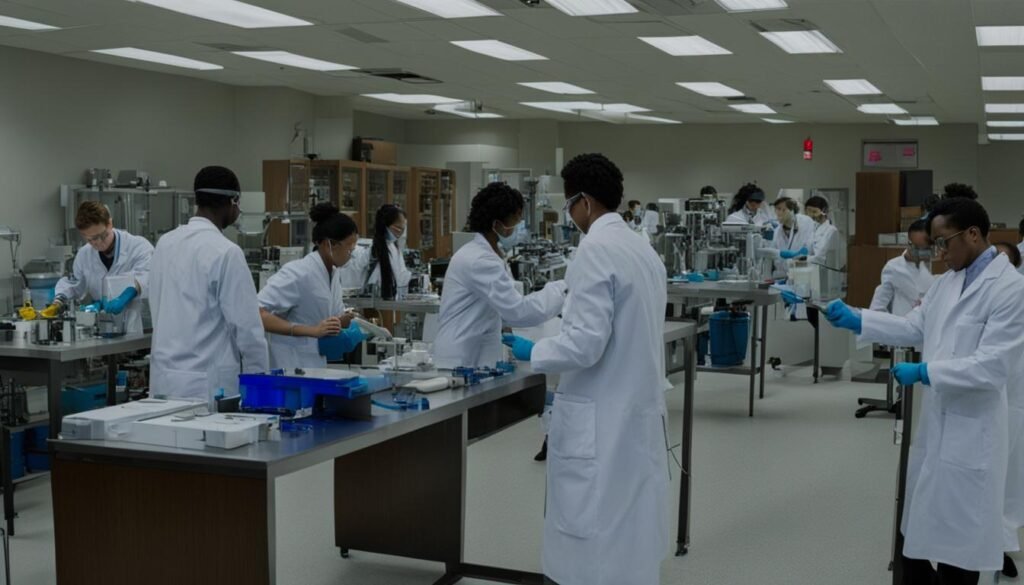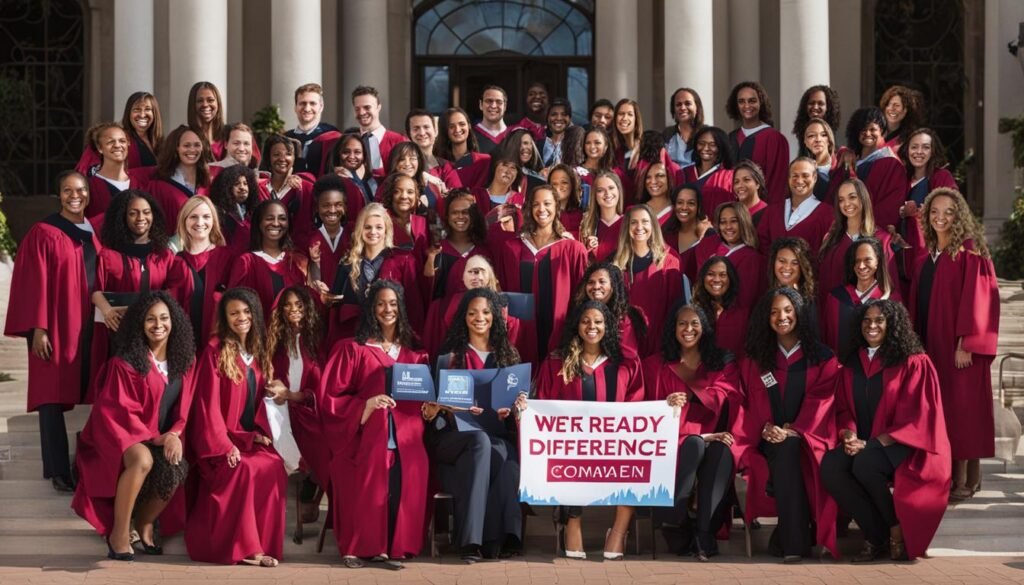Managing the demands of pre-med courses and volunteer work can be a daunting task for students in Filipino colleges. Striking a balance between these commitments is crucial to ensuring a fulfilling academic journey.
Pre-med courses lay the foundation for a successful medical career, equipping students with the necessary knowledge and skills. These courses are rigorous and demanding, requiring students to dedicate a significant amount of time and effort to excel academically.
However, volunteer work also holds immense value in shaping future healthcare professionals. Engaging in volunteer activities allows students to gain real-world experience, develop empathy, and make a positive impact on their communities.
Combining pre-med courses with volunteer work can be challenging, but it is not impossible. By effectively managing time, setting priorities, and maintaining a strong support network, students can strike a balance and thrive in both areas.
Key Takeaways:
- Balancing pre-med courses and volunteer work is essential for students in Filipino colleges.
- Pre-med courses provide the necessary knowledge and skills for a medical career.
- Volunteer work allows students to gain real-world experience and make a positive impact.
- Effective time management and setting priorities are crucial in balancing both commitments.
- A strong support network can provide assistance and guidance to students.
Factors Contributing to the Well-being of Medical Students
A study conducted at the UP College of Medicine in the Philippines aimed to explore the various factors that contribute to the well-being of medical students. This study shed light on the concerns and priorities of these students, providing valuable insights for enhancing their overall experience and performance.
The findings of the study revealed that medical students expressed higher levels of concern regarding factors such as work-life balance, demands, finance, and perceived support on personal and health issues. These are crucial aspects of their lives that significantly impact their well-being and ability to thrive academically.
Although medical students showed less concern about factors such as culture, safety at work, travel and orientation, and perceived support for academics, it is important to acknowledge the potential influence of these elements on the overall well-being of our aspiring doctors. By addressing the areas of improvement in all these domains, we can create a more nurturing and supportive environment for medical students, leading to enhanced engagement and performance.
Ensuring the well-being of medical students is not only essential for their personal growth and development but also for the betterment of the healthcare sector as a whole. By prioritizing their concerns and providing the necessary support, we can empower our future healthcare professionals to thrive and make a positive impact on society.
Let’s explore the strategies and initiatives that can be implemented to address these factors and create an environment that fosters the well-being of medical students.
Strategies for Enhancing Well-being in Medical Students
– Implementing programs to promote work-life balance, such as flexible schedules and mindfulness practices.
– Providing financial support and resources to ease the burden of medical education costs.
– Establishing mentorship programs and support networks to address the personal and health concerns of medical students.
– Creating a positive and inclusive culture within medical institutions, fostering a sense of belonging and support.
– Enhancing safety measures in medical settings to alleviate stress and anxiety among students.
– Incorporating travel and orientation programs that expose medical students to diverse healthcare practices and perspectives.
– Strengthening academic support systems to ensure medical students have access to the resources they need to excel.
By implementing these strategies and continually working towards improving the well-being of medical students, we can create a nurturing environment that cultivates resilience, fosters growth, and empowers our future doctors to thrive both personally and professionally.
Why People Go to Medical School and Choose to Become Doctors
Many individuals are drawn to the field of medicine and opt to attend medical school to pursue their dream of becoming doctors. The motivations behind this career choice are varied and personal, but they all share a common thread: a passion for improving the health and well-being of others.
The medical profession is often regarded as noble and impactful, as it provides individuals with the opportunity to make a significant difference in the lives of patients. Doctors have the privilege of helping individuals recover from illness, alleviate pain, and improve their overall quality of life.
Furthermore, pursuing a career in medicine allows individuals to develop essential leadership skills. Doctors are entrusted with the responsibility of making critical decisions, working as part of a multidisciplinary team, and effectively communicating with patients and their families. These skills not only benefit doctors in their medical practice but also have applications in various other professions.
Moreover, the field of medicine offers diverse job options, both in clinical and non-clinical settings. Clinical practice allows doctors to directly interact with patients, diagnose illnesses, and provide treatment. On the other hand, non-clinical roles, such as research, teaching, or healthcare administration, offer opportunities to contribute to the advancement of medical knowledge and the improvement of healthcare systems.

In conclusion, the decision to attend medical school and become a doctor is driven by a combination of factors such as the desire to improve the health of others, the noble profession, the chance to develop leadership skills, and the availability of diverse job opportunities. These motivations inspire individuals to embark on a challenging yet fulfilling journey to make a positive impact on the lives of others.
Challenges Faced by Doctors in the Philippines
Doctors in the Philippines face significant challenges, particularly in light of the ongoing COVID-19 pandemic. The healthcare system has been overwhelmed with overcrowded hospitals, a scarcity of medical supplies, and high fatality rates linked to the virus.
The surge in COVID-19 cases has put immense pressure on healthcare professionals, pushing doctors to their limits as they tirelessly work to provide essential care to patients. The shortage of medical supplies, such as personal protective equipment (PPE) and ventilators, has further exacerbated the situation, putting both doctors and patients at risk.
Additionally, the high fatality rates associated with the virus have taken a toll on the mental and emotional well-being of doctors. Witnessing the loss of numerous lives each day can lead to burnout, anxiety, and a profound sense of grief among healthcare professionals.
Despite these challenges, doctors in the Philippines continue to demonstrate resilience and dedication to their profession. They work tirelessly to provide the best care possible, even in the face of limited resources and overwhelming circumstances.

It is crucial for the government and relevant authorities to address these challenges and provide adequate support to doctors. This includes ensuring the availability of sufficient medical supplies and equipment, implementing measures to reduce the transmission of the virus, and prioritizing the well-being of healthcare professionals through mental health support programs.
By addressing these challenges and providing the necessary support, the healthcare system in the Philippines can better equip doctors to navigate the current crisis and continue their vital work in saving lives.
Different Opportunities for Medical School Graduates
Upon graduating from medical school, medical school graduates are presented with a myriad of opportunities to pursue. These opportunities allow them to contribute to society and make a positive impact in various fields. Whether one has an interest in public health, academia, forensics, research, sales, sports medicine, or volunteering, there are diverse paths to choose from.
Medical school graduates can opt to work as public health workers, focusing on preventive healthcare measures and improving community health. By promoting awareness and implementing interventions, they can help create healthier populations.
In the field of academia, medical school graduates can become medical teachers, sharing their knowledge and expertise with aspiring healthcare professionals. Through education, they play a vital role in shaping the future of medicine.
Forensic medicine offers another intriguing opportunity for medical school graduates. By becoming forensic medical examiners, they can investigate and provide expertise in cases involving suspicious or unnatural deaths. Their work contributes to the pursuit of justice and the resolution of complex legal matters.
In the realm of medical and pharmaceutical research, medical school graduates can contribute to advancements in medicine and healthcare. Through their research expertise, they can develop new treatments, medicines, and diagnostic tools that can improve patient outcomes.
For those with an inclination towards sales and marketing, careers as medical sales representatives can be pursued. In this role, medical school graduates promote and educate healthcare professionals about medical products and pharmaceuticals, facilitating the delivery of necessary treatments to patients.
Sports and exercise medicine is an emerging field that presents exciting opportunities for medical school graduates. By specializing in this area, they can work with athletes and individuals engaged in physical activities to optimize performance, prevent injuries, and enhance overall well-being.
Lastly, medical school graduates can choose to engage in volunteer work, providing their medical expertise and services to underserved communities. Volunteering allows them to give back, improve access to healthcare, and make a difference in the lives of those in need.

Preparation: High School and College
High school and college play crucial roles in preparing for a career in medicine. While high school provides a foundation for academic and personal growth, college offers the opportunity to delve deeper into the sciences and develop the necessary skills for success in medical school.
In high school, it is advantageous to take science, technology, engineering, and math (STEM) courses to build a strong scientific knowledge base. These courses lay the groundwork for understanding complex medical concepts and developing critical thinking skills. However, it is essential to note that pursuing other tracks and non-science disciplines can also contribute to a well-rounded education, fostering skills such as communication, problem-solving, and empathy.
During college, pre-med courses are not obligatory, but they can provide invaluable preparation for medical school. These courses delve into subjects such as biology, chemistry, physics, and biochemistry, equipping students with a solid understanding of the fundamental concepts that underpin medical practice. Additionally, pre-med courses offer opportunities for students to acquire laboratory and research experience, which can further enhance their readiness for the rigors of medical school.

By investing time and effort into high school and college studies, aspiring medical students can build the necessary foundation to thrive academically and make a meaningful impact in the field of medicine.
Volunteer Work in Filipino Colleges
Volunteer work in Filipino colleges offers students a unique opportunity to make a positive impact on their communities while gaining valuable experience. Engaging in volunteer work not only allows students to develop their skills and knowledge but also fosters a sense of social responsibility and empathy towards others.
One organization that facilitates volunteer opportunities in the Philippines is Volunteering Solutions. They provide support and resources for volunteers, ensuring a seamless experience throughout their journey. Whether it’s airport transfers, accommodation, meals, or weekend trips, they offer comprehensive assistance to ensure volunteers can focus on making a difference.
By participating in volunteer work, students can broaden their horizons, expand their network, and acquire practical skills that will benefit them in their future endeavors. It allows them to apply what they have learned in the classroom to real-life situations, making their education more meaningful and memorable.
Moreover, volunteer work offers students the chance to discover their passions and develop a deeper understanding of the challenges faced by their communities. It empowers them to become agents of change and advocate for the issues that resonate with them the most.
Volunteering in Filipino colleges is not only about giving back; it is also an opportunity for personal growth and self-discovery. It allows students to develop essential qualities such as leadership, teamwork, and resilience. These qualities are highly valued in various professional fields and can give students a competitive edge in their future careers.
In summary, volunteer work in Filipino colleges presents a remarkable opportunity for students to make a positive impact on their communities, gain valuable experience, and foster personal growth. By actively engaging in volunteer activities, students can contribute to meaningful change and develop essential skills that will benefit them throughout their lives.
Conclusion
Successfully balancing pre-med courses and volunteer work in Filipino colleges requires dedication, careful planning, and an understanding of the factors that contribute to well-being. By prioritizing work-life balance, managing financial challenges, and seeking support for personal and health issues, medical students can navigate the demands of their academic journey more effectively.
Furthermore, medical school graduates have a range of opportunities available to them, from clinical practice to research and teaching. Exploring these options allows graduates to find their true passions and make a positive impact on society through their chosen career path.
Preparation is also crucial in achieving success in medical school. While a strong foundation in the sciences is important, students should not feel limited to a specific pre-med track. Non-science disciplines and other tracks can provide valuable skills and perspectives that enhance their medical education.
In conclusion, by understanding the factors that contribute to well-being, pursuing opportunities beyond medical school, and preparing effectively in high school and college, Filipino students can embark on a fulfilling journey in the field of medicine. Balancing pre-med courses and volunteer work not only leads to personal growth but also allows them to make a meaningful difference in their communities.


